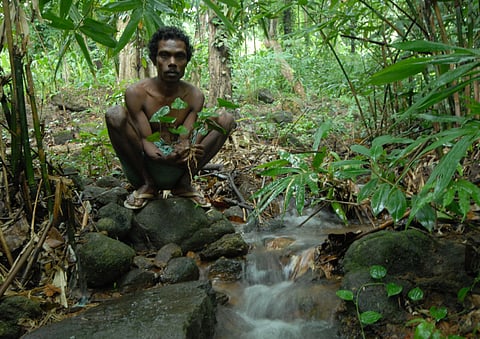

Kuttimathan Kani, the forest elder who revealed Arogyapacha, has died in poverty at 72.
His discovery once inspired the world’s first biodiversity benefit-sharing model.
The “Kerala model” collapsed amid mismanagement, neglect and corporate profiteering.
The Kani community was left without royalties, rights, or recognition.
His life exposes how conservation without justice can exploit those it claims to protect.
On August 23, 2025, a frail 72-year-old tribal elder drew his last breath in a leaking hut on the edge of Kerala’s Agasthyamalai forests. For his neighbours, he was simply Kuttimathan, a father, a guide and a daily-wage worker who often struggled to put food on the table. But to the outside world, he was the man who first revealed the secrets of Trichopus zeylanicus, known locally as Arogyapacha, the “ginseng of Kerala”that once set off a global debate on biopiracy, benefit-sharing and the ethics of conservation.
When news of his death trickled out, no government official, no scientist and no state representative came to his cremation. The silence spoke volumes. Two decades after he had stood on a world stage in Johannesburg to receive the United Nations’ Equator Prize, the man who symbolised India’s so-called “model” of indigenous benefit-sharing died in poverty, surviving on free rations and wild tubers.
For years before cancer claimed him, deprivation had already hollowed out Kuttimathan’s life. His wife was bedridden with untreated uterine complications and ulcers. His daughters once fought chickenpox without medical help. Their fragile hut leaked in the monsoons, leaving the children sick from damp and cold. Too weak for manual labour, he often said the forest spirits had abandoned him.
His story was not unique, only starker. The Kani community, just 16,000 people scattered across Kerala and Tamil Nadu, have long lived on the margins: Alienated from their forest lands, denied basic healthcare and watching their culture erode.
But the irony in his case cut deeper. The very plant that scientists believed would transform tribal lives became a textbook case of how indigenous knowledge can be extracted, commercialised and sold, while its keepers are discarded.
In 1987, while guiding scientists from the Tropical Botanic Garden and Research Institute (TBGRI), Kuttimathan and fellow tribesman Mallan pointed to a creeping herb their elders used to fight exhaustion. The scientists quickly recognised its potential. By the mid-1990s, a formulation named Jeevani was developed, marketed as anti-fatigue, anti-oxidant, adaptogenic and liver-protective.
In 1995, TBGRI struck a licensing deal with Arya Vaidya Pharmacy in Coimbatore: Rs 10 lakh upfront and a 2 per cent royalty on sales. Half of the benefits were to flow back to the Kani community through a specially created Kani Samudaya Kshema Trust. The arrangement was hailed internationally as the world’s first biodiversity benefit-sharing model, even before the Convention on Biological Diversity was fully in place.
The promises quickly unravelled. The trust was mismanaged; funds dwindled, and assets such as a welfare building and a vehicle fell into disrepair. The contract was not renewed when it lapsed. Meanwhile, more than a dozen companies worldwide began selling Jeevani-like formulations without offering a rupee to the Kanis.
For a largely illiterate community, paperwork and legal claims were alien terrain. They had little grasp of royalties or intellectual property rights. “We were kept in the dark right from the beginning,” Kuttimathan once said. “Even now, companies collect the plant from our forests. Our people have lost their voice.”
Even the scientific fraternity deepened the wounds. While global institutions celebrated TBGRI’s partnership with the Kanis, the reality was more extractive. Dr P Pushpangadan, TBGRI’s former director who shared the Equator Prize with Kuttimathan, later dismissed him as a “drunkard”, blaming his poverty on personal failings rather than systemic neglect.
Only Kuttimathan was officially credited with the knowledge, sidelining Mallan and fuelling resentment in the community. The rifts resembled old colonial strategies of divide and rule. As one tribal leader, Mani, remarked: “Everybody blames us for foolish decisions, but no one talks about the profits others made.”
What was once held up as a triumph of indigenous-science collaboration is now remembered as a cautionary tale of appropriation. The much-vaunted “Kerala model” of benefit-sharing collapsed because it lacked equity and enforcement. Scientists gained recognition, companies made money, but the Kanis remained where they had always been, trapped in hunger and neglect.
Even after travelling to Johannesburg in 2002 and speaking proudly of his forests, Kuttimathan returned home to sickness and poverty. Recognition brought him neither healthcare for his family nor education for his children.
With his passing, the paradox has come full circle. Arogyapacha continues to be marketed as a wonder herb, and scientific papers still cite the TBGRI–Kani model as a milestone in benefit-sharing. But on the ground, the man who first opened the forest path to the plant leaves behind a widow in ill health, daughters scarred by deprivation, and a community that feels betrayed.
For policymakers, his life is more than an obituary, it is an indictment. Unless benefit-sharing is backed by law, transparency and genuine equity, India’s biodiversity-rich communities will continue to be robbed in the name of conservation.
His absence now lingers in the silence of the Agasthyamalai, where he once walked barefoot, guiding scientists to the so-called “immortality herb”. Kuttimathan Kani’s story is a stark reminder that conservation without justice is merely another form of exploitation.
Alka Elizabeth is an independent journalist based out of Thiruvananthapuram.
Views expressed are the author’s own and don’t necessarily reflect those of Down To Earth.